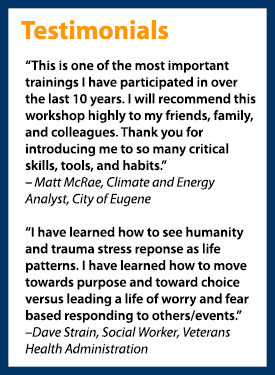Leadership for ResilienceTM
Six-Week Web-Based Workshop
Enhancing your capacity to heal, grow, and flourish in the midst of stress and adversity
When: Tuesday’s beginning April 14 from 12

noon-1:30 pm PDT (3:00-4:30pm EDT) (Dates: April 14, 21, 28, & May 5, 12, 19)
Cost: $150 per person
Register here
Why Attend This Workshop?
Do you often feel stressed out by pressures at work or the hassles of modern life? Do economic, social, or environmental injustices sometimes overwhelm you? Would you like to learn simple skills to transform the way you respond to stress and adversity and increase your physical health, effectiveness, and happiness? If so, the Building Your Personal Resilience web-based workshop can benefit you.
Humans are hardwired for resilience. This highly interactive workshop will teach evidence-based skills to help you acknowledge and enhance your natural capacity to weather life’s storms in a calm and confidant way and use adversity to heal, grow, and flourish.
What Will You Learn?
In this workshop you will learn how to apply the 6-part Resilient Growth© model in any stressful or traumatic situation to enhance not only your own wellbeing—but the wellbeing of others as well. The 6 elements of the model include:
• Ground—and center yourself by calming your emotions and thoughts.
• Remember—your personal skills as well as internal and external resources.
• Observe—the situation and your views about it non-judgmentally with self-compassion.
• Watch—for new ways to respond to adversity while mourning losses.
• Tap---into the core values you want to live by in the midst of stress and adversity.
• Harness—your strengths to make choices that enhance both personal and collective wellbeing.
What Type of Knowledge Will I Gain?
• How the human body naturally enters a state of hyperarousal when it experiences actual or perceived stress and adversity.
• The effects of hyperarousal on individual perception, problem solving, behaviors, and their associated psychosocial outcomes.
• Simple skills to enhance your capacity to stay centered and calm in the midst of any stressful and traumatic situations.
• Simple skills to use stress and adversities as catalysts to transform the way you see and respond to the world and increase your level of functioning.
• The personal and social benefits of Transformational Resilience.
What Type of Resilience Skills Will I Learn?
• “Presencing skills” to calm and center yourself in the midst of stress and trauma including body-based (somatic), awareness-based (mindfulness), and thought-based (cognitive) techniques.
• “Purposing skills” to find meaning, direction, and hope in the midst of stress and trauma including innovation-based option expansion, values-based decision-making, and strength-based learning and growth techniques.
Who Should Attend?
This workshop is helpful for anyone interested in learning how to identify and cultivate their capacity to care for themselves, thrive, and flourish in the midst of all types of stress and adversity. The course is especially useful for:
• Child, family, and adult mental health providers and others in the human services field interested in learning how to better care for themselves.
• Business executives, managers, and staff who are interested in integrating enhanced resilience into their professional work or home life.
• Climate change, natural resource, social justice and human rights activists, and others engaged in social change work interested in learning how to care for themselves.
• K-12 teachers, staff, and administrators and higher education faculty and staff seeking ways to build their resilience and the resilience of their students and staff.
• Youth leaders focused on the increasing the health and wellbeing of young people.
• Public health, emergency management, police and fire personnel who are frontline responders in natural disasters and other emergencies.
• Clergy, chaplains, and other members of the faith and spiritual communities that want to enhance the resilience of their constituents and members.

 noon-1:30 pm PDT (3:00-4:30pm EDT) (Dates: April 14, 21, 28, & May 5, 12, 19)
noon-1:30 pm PDT (3:00-4:30pm EDT) (Dates: April 14, 21, 28, & May 5, 12, 19)







